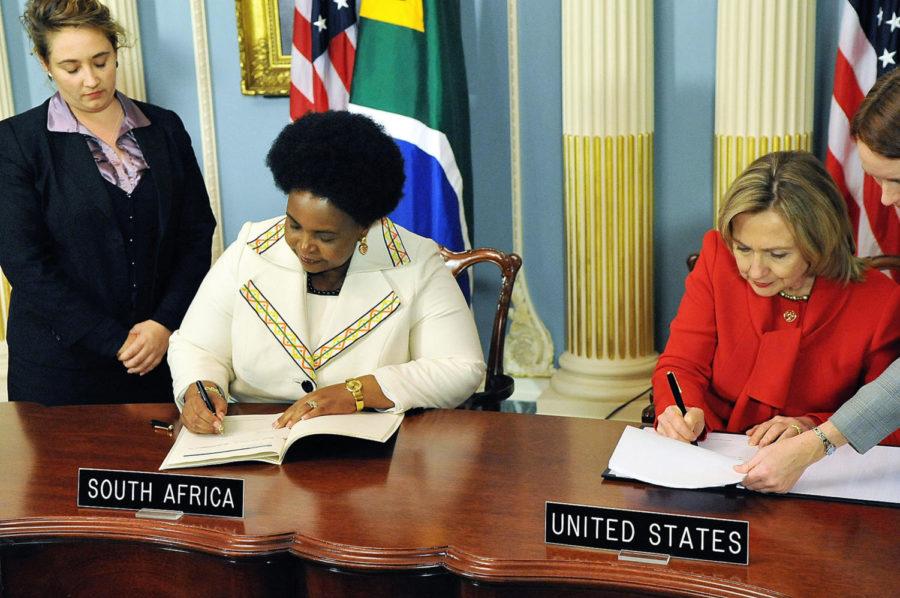Gross: U.S. must reboot funding for global HIV/AIDS treatment
Then-U.S. Secretary of State Hillary Clinton and South Africa’s Minister Maite Nkoana-Mashabane sign the PEPFAR, a program that offers funding for AIDS relief worldwide. Although lawmakers have given attention to the AIDS pandemic, many wonder if more can be done.
December 3, 2013
Amid the pressures of the Affordable Care Act and the health care website, as well as the tension in Syria and other areas around the world, it seems unreasonable to expect Congress to tackle yet another problem.
However, that is what much of the public, and some lawmakers, are calling for. Forty representatives from either dominant political party approached President Barack Obama with new plans on the government’s funding and treatment of the HIV/AIDS issue. These representatives want the United States to double efforts made to alleviate AIDS in Africa. The group wants to increase the funding for anti-retroviral drugs provided through the President’s Emergency Plan for AIDS Relief program.
The program was established in 2003 under President George W. Bush, who, despite receiving criticism for many other issues at home and abroad, has done more than any other president when it comes to global HIV/AIDS relief.
Before his campaign, HIV and AIDS were thought of as “someone else’s problem,” belonging only to certain social or geographical communities. In fact, AIDS was commonly referred to as Gay-Related Immune Deficiency in the 1980s; so misinformed were we about it. We were additionally aware that it was a rampant problem in Africa, but that foreignness is what made us, for the most part, ignore the problem. Recognizing its prevalence in America — not only in the gay or drug using communities — was necessary to enact change. By initiating out-of-country funding, Bush took a huge step toward both legitimizing it as a problem and fixing it.
Under the Obama administration, PEPFAR funding has fallen by 12 percent, according to a recent USA Today article.
The same article says Obama has faced similar criticism from Global Aids Alliance, which feels that his money pledge was lower than the United States could afford, which led other contributors to pledge lower amounts as well.
When it comes to the HIV/AIDS problem within the United States, Obama has done somewhat better, establishing programs to help those who suffer pay for their various treatments and medications. Medical advances have led to those infected with HIV living longer lives than ever before, but there still remains no cure to either HIV or AIDS. Until a cure is found, expensive treatment is the only recourse.
People who have HIV and live to see their mid-years suffer from much financial stress, according to the 50 Plus Report. Whether this is a result of needing expensive medication, being unable to keep a job or spending money quickly on the basis of expected death it cannot be denied that those who have HIV or AIDS require this support.
However, even these programs are imperfect, with reported waiting lists into the thousands. When the economy went sour in 2010, many who lost their jobs and health care were in turn refused coverage through the AIDS Drug Assistance Program. The thought is there, it just has not been carried out well.
In his State of the Union address, Obama claimed the establishment of a completely AIDS-free generation is “within our reach.” With these words, he has practically pledged that not only is this state reachable, but that it will be reached. Though not an outright promise, this is a heavy assertion to make. And certainly, we would expect Obama, having made this statement, to put forth more funding and effort than any of his predecessors. Unfortunately, this has not been the case.
Resultingly, we need to remind Obama and our entire government that HIV/AIDS treatment and research is a priority. We cannot forget, amid so many other problems, our strong desire and determination to eradicate HIV/AIDS. The physical suffering, stigmatization and death of a happy future that people with HIV endure should not be ignored.
Here in the United States as well in other parts of the world, HIV/AIDS is a major issue. Unlike war and political strife, over which we all disagree, HIV and AIDS are a tragic equalizer. No person of any nationality, religion, race or political belief should have to suffer from them. It is our duty as Americans to try to drive it out of the country, and our duty as global citizens to see it eradicated entirely.
Past social stigmatization has designated the disease to be a solely African problem or a solely gay problem, but we can now acknowledge that HIV and AIDS are global problems that require a global solution. Whatever other issues our country might be facing, we need to step up in the field of research and relief, to alleviate a sickness from which all may suffer. Let’s work together to reach that much-desired AIDS-free generation.







